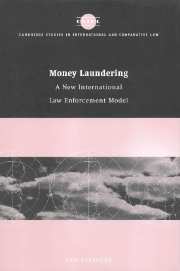Book contents
- Frontmatter
- Contents
- Preface
- Table of treaties and agreements
- List of abbreviations
- Part I New instruments in the fight against acquisitive crime: confiscation of proceeds from crime and criminalisation of money laundering
- Part II The prevention of money laundering
- Part III Jurisdiction over money laundering
- Part IV International co-operation in combating money laundering
- 11 The money laundering regime: new objectives of international co-operation in criminal matters
- 12 The money laundering regime: new modes of international evidence-gathering
- 13 Some of the conditions, principles and exceptions of mutual judicial assistance in criminal matters revisited
- 14 Lifting banking secrecy in an international context
- 15 Provisional measures for preserving alleged proceeds of crime in an international context
- 16 International enforcement of confiscation orders
- Epilogue
- Bibliography
- Index
- CAMBRIDGE STUDIES IN INTERNATIONAL AND COMPARATIVE LAW
11 - The money laundering regime: new objectives of international co-operation in criminal matters
Published online by Cambridge University Press: 16 October 2009
- Frontmatter
- Contents
- Preface
- Table of treaties and agreements
- List of abbreviations
- Part I New instruments in the fight against acquisitive crime: confiscation of proceeds from crime and criminalisation of money laundering
- Part II The prevention of money laundering
- Part III Jurisdiction over money laundering
- Part IV International co-operation in combating money laundering
- 11 The money laundering regime: new objectives of international co-operation in criminal matters
- 12 The money laundering regime: new modes of international evidence-gathering
- 13 Some of the conditions, principles and exceptions of mutual judicial assistance in criminal matters revisited
- 14 Lifting banking secrecy in an international context
- 15 Provisional measures for preserving alleged proceeds of crime in an international context
- 16 International enforcement of confiscation orders
- Epilogue
- Bibliography
- Index
- CAMBRIDGE STUDIES IN INTERNATIONAL AND COMPARATIVE LAW
Summary
Objectives of domestic and international criminal justice
The general objectives of international co-operation in criminal matters are in principle the same as those of domestic criminal justice. The primary purpose is to immobilize the criminal, which requires the tracing and arrest of the suspect as well as the gathering of evidence with a view to his prosecution. The fight against money laundering and the new, profit-oriented perspective of the fight against crime has given criminal justice a new important objective: the confiscation of the proceeds and instrumentalities from crime. These objectives not only govern the activities of law enforcement authorities in a domestic situation, but also in an international context.
International co-operation is sometimes indeed necessary to attain these goals given the transnational nature of the crime phenomenon, for example money laundering. From a strictly international law point of view, international co-operation is necessitated by the concept of sovereignty, which limits powers of a state to take investigatory, provisional and enforcement measures to its own territory (although this view merits to be attenuated from a common law viewpoint). It follows that, conceptually, international co-operation in criminal matters is mostly intended to deal with a lack of enforcement jurisdiction on the side of the requesting state. In the context of the international fight against money laundering, the lack of enforcement jurisdiction may take two forms. First, information required to prove the money laundering offence and/or the predicate offence will often be located on the territory of another state than the state which intends to prosecute the money laundering offence.
- Type
- Chapter
- Information
- Money LaunderingA New International Law Enforcement Model, pp. 251 - 257Publisher: Cambridge University PressPrint publication year: 2000



